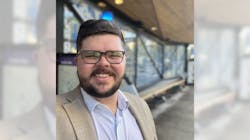2022 40 Under 40: Xavier Harmony
One word to describe yourself: Inquisitive
Alma Mater: Queensland University of Technology (bachelor’s degrees); Penn State University (master’s); Virginia Tech (where I’m currently completing my PhD)
Fun fact about yourself: I was featured in an ad campaign for my undergraduate university (QUT) and my face was on bus stops and train stations around my home city in Queensland, Australia.
Favorite station or stop that you have ever visited or frequent (and why): Brisbane Central train station. I’ve spent a lot of time there connecting from my home to work, university, shopping and recreation. It both reminds me of where I’m from while personally highlighting the variety of trips transit serves.
Favorite route you have ever ridden or frequent (and why): Powell/Mason cable car line in San Francisco. When I interned at SFMTA, I lived on this line and caught the cable car from outside my apartment to Market Street almost every day. It’s a unique form of transit from a really fun time of my life and career (I have a sketch of a cable car on this line in my home office).
Xavier Harmony’s journey to the North American transit sector started half a world away in his native country Australia before an internship brought him to the U.S. Colleagues describe Harmony as dedicated, engaging, humble and someone who can provide insight under high-stress situations. A charming point made on his nomination explained he has the ability to speak to both people and computers with ease.
Harmony is credited with breaking down jargon and is talented at communicating important concepts without coming across as condescending. He works to engage and empower those beginning their careers. For example, he has invited others to learn and participate alongside him including in proposals for the Transportation Research Board (TRB) to better understand the submission and research processes.
Harmony has intentionality with his engagements of colleagues and strives to uplift people who are traditionally underrepresented in the transportation industry: finding ways to engage with, highlight, recommend and listen to people of color, women, people with disabilities and members of the LGBTQ+ community. This is demonstrative of his belief and practice that involving people from nontraditional backgrounds from the beginning will enable more robust and stronger transportation planning results.
He is vocal about his efforts to be a meaningful ally rather than a performative one, and is very giving of himself, his expertise and his time to ensure that he uses his privilege and advantages to give back to others who do not have those same opportunities.
Harmony juggles parenthood, being a full-time professional, as well as a Ph.D. student, yet makes time to provide resume reviews, reviews paper submissions, offers career advice and guidance to young professionals, mentors colleagues who enter the field later in life and ensures the representation of nontraditional transportation industry professionals.
Harmony is proud of how he has been able to advance transportation equity discourse and share it with a larger audience through his award-winning Eno essay, “A New Bus Priority,” that focused on transit service equity, as well as his research on bikeshare equity that he presented at TRB.
Outside of work, Harmony’s efforts support transit and transportation focused entities. He has served in numerous roles for Young Professionals in Transportation, including as the director of membership, international; deputy chair, D.C. Chapter; vice chair for administration, D.C. Chapter; and deputy vice chair for administration, D.C. Chapter. Harmony’s transportation research includes as a panel member TCRP Project J-11/Task 39: An Evaluation of Fare-Free Public Transportation, as a member of AP025 Public Transportation Planning and Development and as member of AP010 Transit Management and Performance.
Is there a specific experience that led you to where you are today?
When I was completing my undergraduate degrees in Australia, I was originally planning to work in construction and infrastructure advisory. In my final year, one of my professors, Dr. Jonathan Bunker, mentioned a U.S. transportation planning and engineering firm was looking for interns. As I had always wanted to work overseas, I applied. In 2012, I moved to the U.S. and joined Kittelson and Associates in their Reston, Va., office and started learning about the world of transportation, including transit. I had discovered my professional passion and now, 10 years later, couldn’t image working in any other field.
What do you enjoy most about your job?
The people. So many of my colleagues and peers care about the work they do, and I think that makes a big difference to a positive workplace experience. There are so many reasons to be passionate about working in transit including improving social equity, mitigating environmental impacts of transportation, the opportunity to serve others or even the goals of moving people or using finite resources efficiently. All these reasons overlap with my own values and it’s great working with people who are passionate about some of the same things.
Accomplishment you’re most proud of and why?
The first time I was called a mentor. A friend of mine in the industry was in a tough spot and I was able to help them with some advice, some professional connections and some job leads. I didn’t think of myself as a mentor until my friend used the word. I felt so honored they saw me that way.
Best advice/tip/best practice to share from your area of expertise?
The technically strongest or most cost-effective solution is not always the solution that is implemented. Relationships and politics are often more important for getting a project or policy implemented. This is especially true when transit must compete with cars for funding and space. Taking the time to understand local and regional politics, learning how to navigate the politics and building strong relationships can go a long way to helping achieve transportation policy and project goals.
